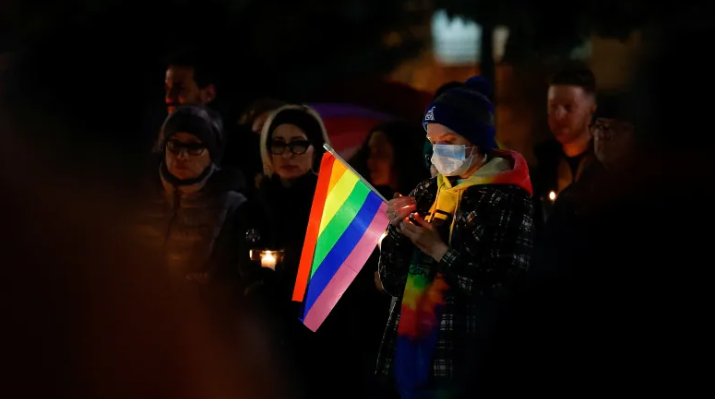How the American anti-LGBTQ hate machine is posing a threat to Canadians

In wake of Colorado nightclub shooting, ex-intelligence official warns of spillover effects of U.S. politics
Seth Compton woke early one morning in July to his phone buzzing furiously with new messages. A wave of hate, stirred up far away, was starting to crash down on the LGBTQ youth centre he runs in North Bay, Ont.
A flyer for an upcoming drag show at the centre had been posted by Libs of Tik Tok, a homophobic and transphobic Twitter account that has around 1.5 million followers and is reportedly run by a New York real estate agent.
For more than a week afterward, OutLoud North Bay — one of the few dedicated spaces for LGBTQ youth in northern Ontario — received thousands of death threats and other hateful comments spawned from that initial post on Twitter, Compton said.
The reaction shocked him and scared many of the 400 youths who use the colourful space on Delaware Avenue.
“One of the kids asked me if the windows were bulletproof,” Compton said. He has since installed security cameras, a digital key is needed to get into the centre and staff now carry panic buttons.
“This level of public hate discourages people from coming out. It discourages people from feeling like they can be safe with their identity.”

Libs of Tik Tok is just one part of an ecosystem composed of social media accounts, think-tanks, politicians and personalities that have taken anti-LGBTQ hate from the margins of American political life back into its mainstream.
In the wake of the recent massacre at a drag show in Colorado Springs, many LGBTQ advocates in the U.S. have pointed to this cultivated hatred to argue the shooting was far from an isolated incident.
The most prominent figures in the anti-LGBTQ movement were unmoved after the shooting, which left five people dead.
In fact, one day later, Libs of Tik Tok had resumed trying to ridicule LGBTQ people and draw attention to drag events, including one in Colorado.
The account did not respond to a request for comment from CBC for this story.

Drag events are routinely singled out as part of an escalating and multi-pronged attack on transgender rights, even if performing drag is unrelated to gender.
So far this year in the U.S., there have been several confrontations with right-wing militia groups at drag events, bomb threats directed at hospitals providing gender care and hundreds of bills introduced in state houses seeking to roll back LGBTQ rights.
- Loved ones remember 5 people killed at Colorado gay club
- Colorado shooting won’t stop queer people fighting for safe spaces, says advocate
And the level of hate directed at the LGBTQ community in the U.S. has reached a point that it poses a security threat to Canadians, according to a former senior-ranking intelligence official.
“Those messages from the United States, their volume, the fact that they’re being amplified by hostile actors … [it] has the potential of affecting those communities here in Canada,” said Artur Wilczynski, who until recently was the associate deputy chief of signals intelligence at the Communications Security Establishment, Canada’s cryptologic agency.
“And we need to be prepared to respond to that. We need to be able to do more than just speak about it.”
LGBTQ rights in the U.S
Many social conservatives in the U.S. have long been fixated with restricting the freedoms of Americans who identify as LGBTQ, but there has been marked increase in recent legislative attempts to restrict their rights.
Republican politicians, including Florida Gov. Ron DeSantis, often frame such bills as protecting parents’ rights and say they are concerned about the sexualization of children.
But the Human Rights Campaign, one of the largest LGBTQ advocacy groups in the U.S., considers much of this legislation to unfairly target transgender children.
They say more than 300 anti-LGBTQ bills have been tabled so far this year in state legislatures. More than 200 such bills were tabled last year; 41 were tabled in 2018.
These bills typically include proposals to bar trans students from playing on sports teams of their gender or to block them from receiving gender-affirming care.
This spike in legislation coincides with an increase in violence against the LGBTQ community in the U.S.
Data compiled by ACLED, a non-partisan organization that tracks violence globally, indicates anti-LGBTQ activity (such as demonstrations, violence and distribution of hateful material) increased from 64 events in the U.S. in 2021 to 193 events so far this year.
According to theHuman Rights Campaign, record numbers of trans or gender non-conforming people were killed in the U.S. in 2020 — at least 44 — and again in 2021, with at least 57 deaths.
Right-wing media outlets have also been devoting more airtime to airing conspiracy theories about trans people, said Angelo Carusone, head of the liberal-leaning media watchdog organization Media Matters.
Among the most common is the misguided belief that children are being “groomed” at public schools and libraries to adopt different genders — a baseless accusation that has long been directed at the gay and lesbian community.
- Shopify won’t cut ties with controversial Libs of TikTok
- ‘Don’t Say Gay’ bill becomes law in Florida, banning sexual orientation instruction from K-3
These concerns are often bundled up with complaints about pedagogical efforts to address systemic anti-Black racism.
“It started with a bunch of extremists using the right-wing echo chamber to hype up their attacks and overly saturate the landscape with instances of these controversial school boards,” said Carusone.
Imara Jones, founder of TransLash Media, a non-profit focused on trans issues, describes the production of anti-LGBTQ hate in the U.S. as the result of a “pipeline” that carries invective from the dark corners of the internet to legislatures.
In this pipeline, popular accounts like Libs of Tik Tok play an important role amplifying conspiracy theories and drawing attention to LGBTQ events, Jones said, which then become the subject of online hate or in-person confrontations.

Alongside that process, Jones said, well-funded conservative think-tanks, such as the Heritage Foundation and Family Policy Alliance, help sanitize the most extreme anti-LGBTQ rhetoric and assist Republican lawmakers with legislation.
“What that means is that you have this campaign of marginalization, dehumanization and hate joining up with political power,” said Jones, who is also the producer and host of a podcast called The Anti-Trans Hate Machine.
“And so when you have those two things merge, you set the stage for violence.”
Time for allies to ‘step up’: LGBTQ youth worker
For the LGBTQ community in Canada, there is a danger when large political institutions in the U.S., such as the Republican Party, back policies that dehumanize gender and sexual minorities, said Wilczynski.
“People who are manipulated by the messages that are being continuously amplified might act out on those things,” he said.
He added that while the rise in anti-LGBTQ rhetoric in the U.S. may not meet the existing legal definition of a national security threat, it does constitute one in a broader sense of the term.

“It leads to a cascade of threats to Canada’s social and cultural and political framework that sees us as an inclusive society,” Wilczynski said.
“So if you have an attack against that framework, it undermines the structure of our society. And for me that is a form of national security threat.”
Tactics used against the LGBTQ community in the U.S. are already widespread in Canada.
Earlier this year,libraries across the country were targeted by harassment and threats for hosting drag storytime events.
On Thursday, as a drag performer read to children inside a library in Hamilton, Ont., police monitored a noisy protest outside where some in the crowd chanted: “Stay away from our children.”
- London, Ont., high school students rally to support trans youth in the U.S.
-
VIDEO
Libraries in Canada hit by wave of hate, threats, as right-wing groups protest all-age drag events
A high school in Oakville, Ont., has been the target of bomb threats three times this month after conservative media outlets circulated images of a teacher who appeared to wear large prosthetic breasts to class.
According to media reports, at least one of the threats referenced the school’s dress code, which accommodates trans students and teachers.

Compton said the instances of anti-LGBTQ hate, both in Canada and the U.S., should serve as a reminder that the community remains vulnerable despite its growing visibility.
“It’s really important for allies to step up and put the work in,” he said. “As an ally, you can’t just come out and celebrate Pride with us in June. We need to be putting in the work 365 days.”
Related News
Trade war, slumping border traffic: What does that mean for the Gordie Howe bridge?
Amid U.S. President Donald Trump’s tariffs which have triggered a trade war with Canada, cross-border trips haveRead more
Trump administration threatens Harvard’s foreign enrolment, tax-exempt status
U.S. Homeland Security Secretary Kristi Noem speaks during an event on April 9, in Washington,Read more
